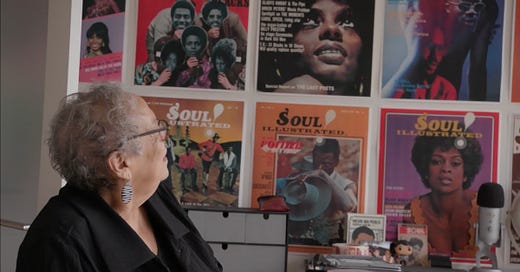Heartland: Who in the Hell is Regina Jones?
You may not have heard of the Soul newspaper or its publisher, but they were 20th century icons of Black music and culture, well-feted in this engaging doc.
For Heartland Film Festival schedule and tickets, please click here.
One of my favorite things about documentary films is the educational aspect of the experience. By that I don’t mean learning a new form of algebra or the names of foreign capitols, but the chance to be introduced to people and histories I might not otherwise have encountered.
I’ll admit I had not heard of the Soul newspaper. Published twice monthly from 1966 to 1982, it focused on Black musical artists and the genres they dominated, especially blues, R&B, jazz and gospel. It essentially acted as an underground network distributed through Black radio stations and record stores, bringing news and opinions from the inside of that community.
Its publisher is the subject of a new documentary, “Who in the Hell is Regina Jones?”, whose title pretty much sums up the film’s mission. It’s directed by Billy Miossi and Soraya Sélène, and is based on the writings and archives of Jones and her eldest grandson, Matt Jones.
Soul was a neat artifact of journalism. It debuted before Rolling Stone and covered a lot of the same ground before a bunch of rich white college graduates got around to it. It enjoyed incredible access to all the big musical stars of the day, from Aretha Franklin to James Brown, and covered the industry in an informative, chatty way — such as when the Temptations kicked out David Ruffin, who gave them an exclusive interview. They were also the first publication to put The Jackson 5 on the cover.
But Regina Jones is a veritable icon in of herself. She and her husband, Ken Jones, an aspiring television broadcaster, started it out of their Los Angeles home. But his career took off after his on-the-street reporting of the Watts Riots, and he essentially dumped the duty of running the publication in the lap of Regina — who was then still in her early 20s with five young children, having married at the age of 15.
Frantically publishing news, scoring exclusive photo sessions with big-name stars, scrounging up advertising and seemingly always on the verge of going under, Soul became Jones’ signature creation — and the albatross around her neck.
“I never had time to process. I was too busy hustling to keep things going,” says Jones, now in her 80s.
The portrait we see is of a tough-as-nails woman who always gave off an aura of command, while secretly feeling overwhelmed and saddled with imposter syndrome. She looks at pictures of herself back in the day and rues that she never acknowledged this fabulously beautiful young woman, instead saying she felt ugly and fat.
Jones started out as a police dispatcher, working the night shift to earn extra money to keep the family afloat. She took some of the first calls that came in about the riot in Watts, where she grew up and not far from their family home. She didn’t condone the violence, but understood the history of persecution of Blacks by L.A. police and the white power structure.
“I was angry, and understood every Black woman that was,” she says.
The film talks to a number of people who contributed to Soul, including photo editor Bruce Talamon and writer Steve Ivory. They were in awe of Jones and hows she ran a national magazine on a shoestring, a national reputation far outstripping their circulation and revenues.
The doc also focuses on Jones’ personal tragedies, including the dissolution of her marriage to Ken, who died at a young age after a high-profile career (including appearing as himself on an episode of “The Brady Bunch”) and was a serial philanderer.
The sharpest dagger to her heart, though, was the long estrangement from her oldest son, Kenny, who disappeared into a quagmire of drug addiction (and passed away during the filming). As a boy, he took an I.Q. test and scored so high the white principal at his school insisted it must have been an error.
Jones also dives into her personal journals, photo albums and films/recordings from her tenure at Soul, including a gossipy phone call with Aretha. She’s content these days to putter around with her dogs and sift through her memories. Her grandson is endeavoring to collect every edition of Soul, digitally scan each page and post them online.
Eventually the paper closed, and Jones enjoyed a healthy second career in public relations, playing on her extensive contacts with musicians and agents — first for a major record label, and then as the head of her own PR firm.
It’s a pretty extraordinary life, and one well-feted in this always engaging doc. I’m sure glad I got to know who the hell Regina Jones is.





